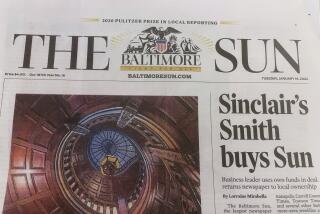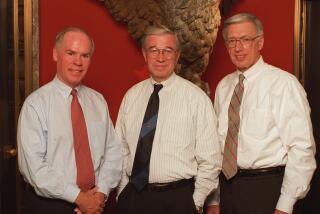Deals by Times Mirror Defended
Two 1998 deals to unload Times Mirror Co. subsidiaries were done for business reasons, and not to dodge taxes, former company executives Mark H. Willes and Thomas Unterman testified Tuesday.
Chicago-based Tribune Co., which bought Times Mirror in 2000, is defending the two deals as reorganizations and fighting an IRS demand for nearly $1 billion in taxes and interest. The IRS claims that the divestiture of the Matthew Bender & Co. and Mosby Inc. publishing units were sales in disguise.
In U.S. Tax Court in Los Angeles, IRS attorney Alan Summers asked former Times Mirror Chief Financial Officer Unterman about a letter sent by Times Mirror’s investment banker to prospective bidders for Bender.
The March 18, 1998, letter from Goldman Sachs & Co. said Times Mirror was seeking to structure the deal in a way that would provide “maximum after-tax proceeds.”
“Didn’t it mean finding a way to dispose of Matthew Bender without having to pay tax on the sizable gain?” Summers asked.
“I didn’t really think that’s what it’s saying,” Unterman said.
The Bender unit and Times Mirror’s stake in another legal publishing outfit were acquired for $1.6 billion by Reed Elsevier Group. Mosby was acquired for $415 million by Harcourt General Inc.
Times Mirror reported gains of nearly $1.4 billion on the transactions. The gains were paid indirectly, in the form of shares in two specially created corporations. Those corporations established limited liability companies whose main assets were the cash from the divestitures.
Willes, formerly chief executive of Times Mirror and publisher of its flagship paper, the Los Angeles Times, said the decision to exit the specialty publishing field was a strategic one as the company focused on newspaper publishing.
“What role did tax play in the decision?” he was asked by a Tribune attorney.
“None,” Willes said.
Willes said he understood that there were “severe restrictions” on how Times Mirror could spend money in the limited liability companies. The money could be used for acquisitions or stock repurchases, for example, but not as working capital.
“We worked very hard to comply not only to the statutes but also to the rules and regulations of the Internal Revenue Service,” he said.
Under questioning, Willes said a $1-million bonus paid to Unterman was based on the success of the transactions, including the tax consequences.
“The entire auction process he was responsible for, and he did it in a magnificent way,” Willes said.
He said a $400,000 bonus paid to Kathryn Downing, former chief executive of Matthew Bender and publisher of the Los Angeles Times from 1999 to 2000, was based entirely on her management of Bender before the transaction.
More to Read
Inside the business of entertainment
The Wide Shot brings you news, analysis and insights on everything from streaming wars to production — and what it all means for the future.
You may occasionally receive promotional content from the Los Angeles Times.










